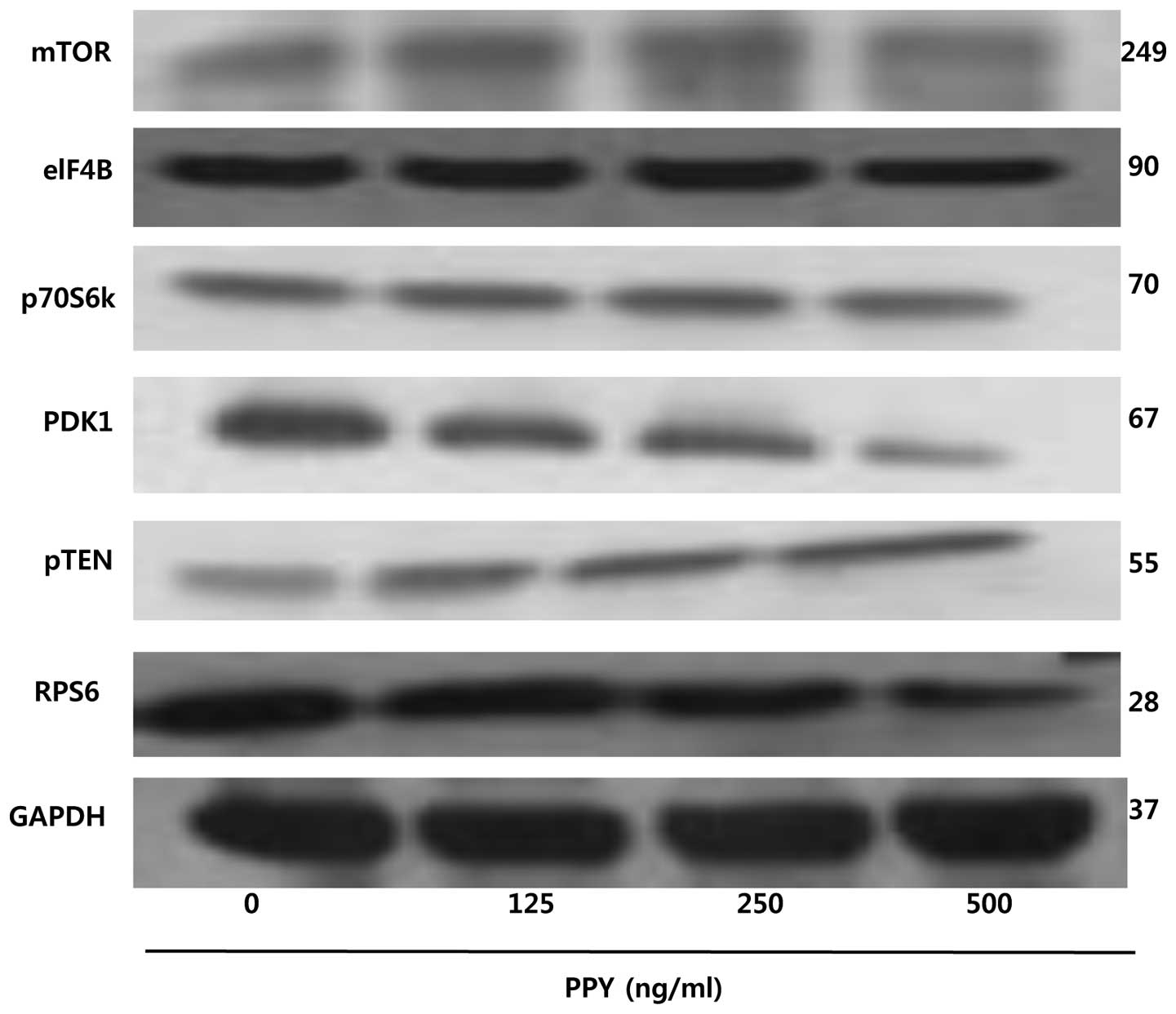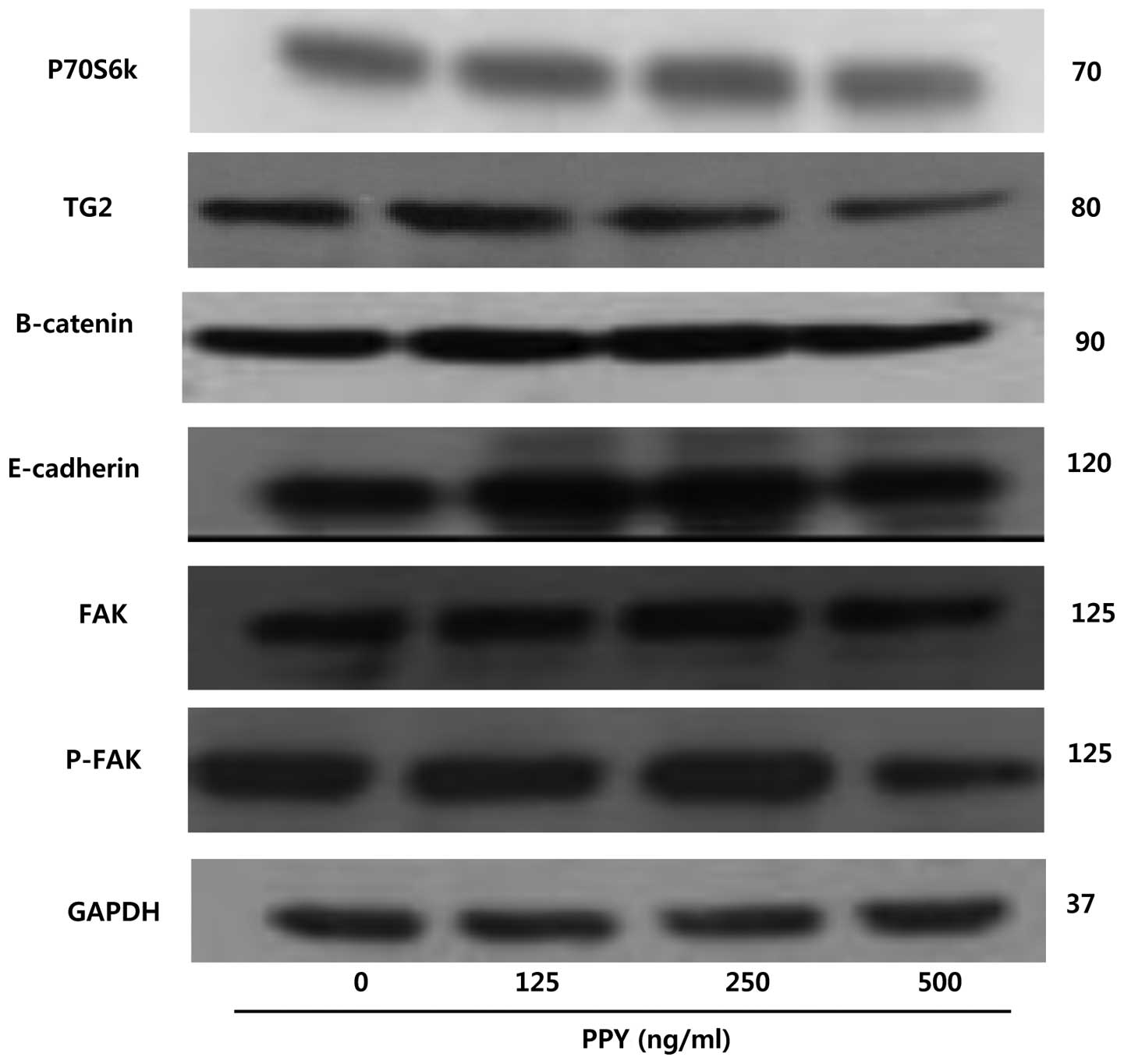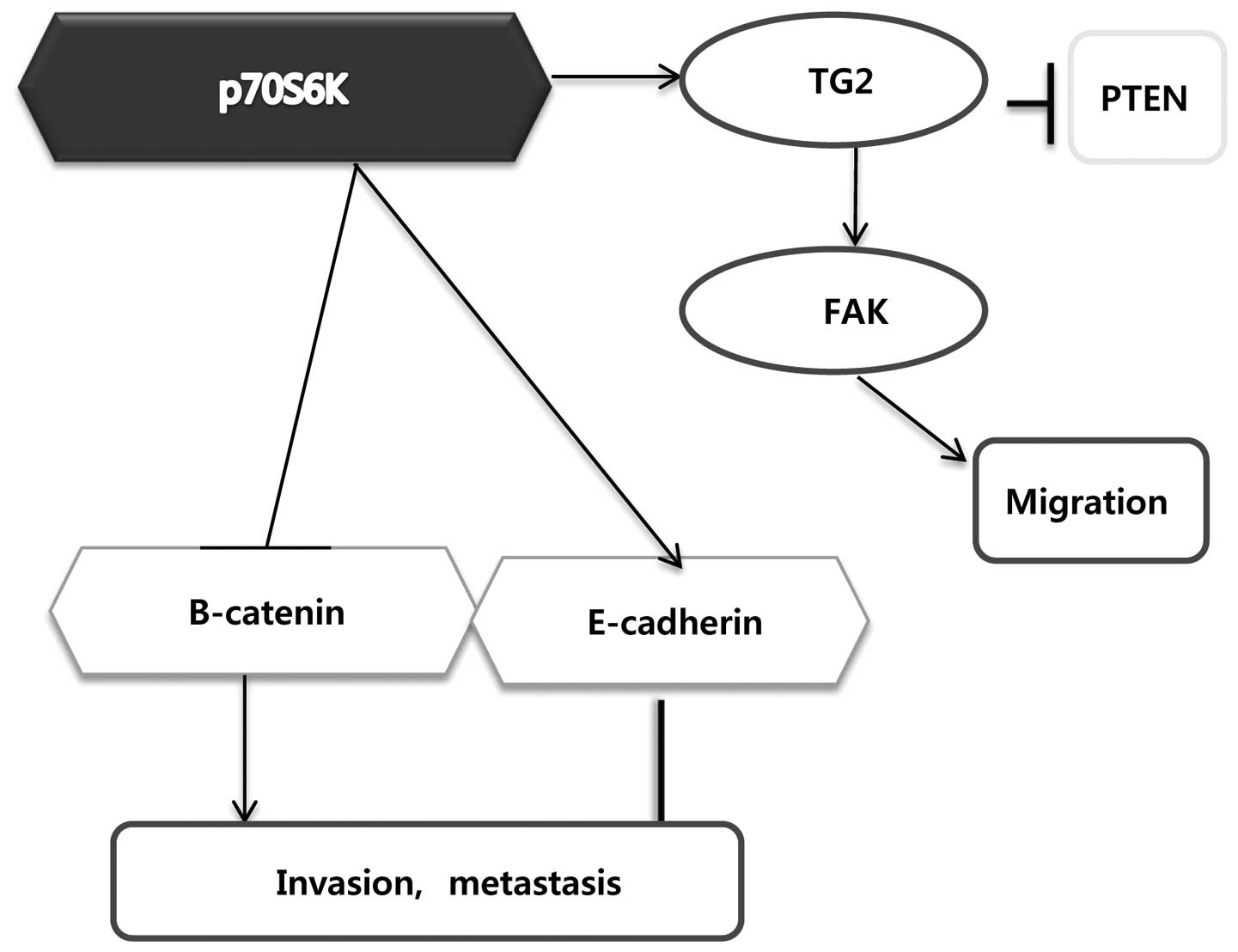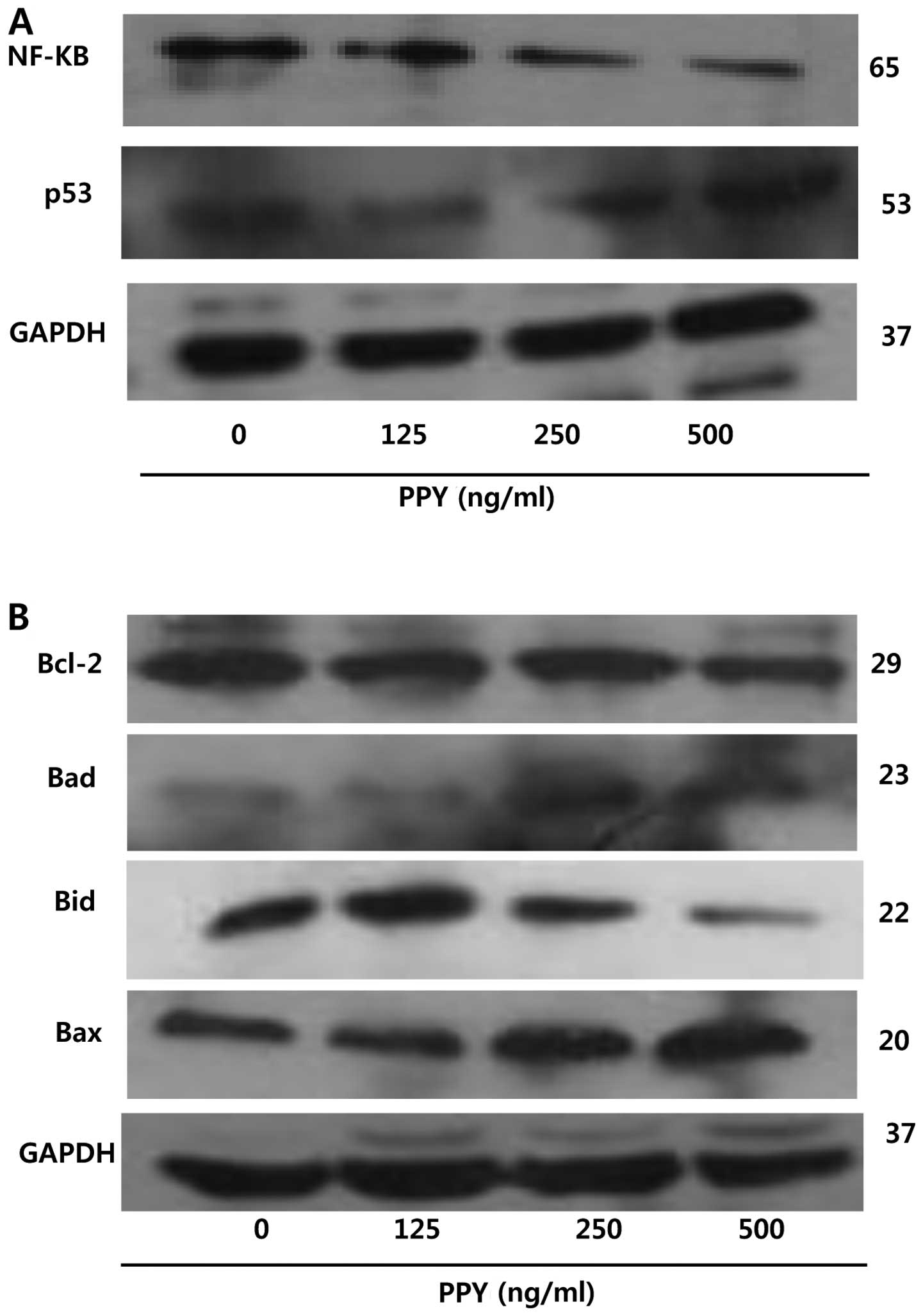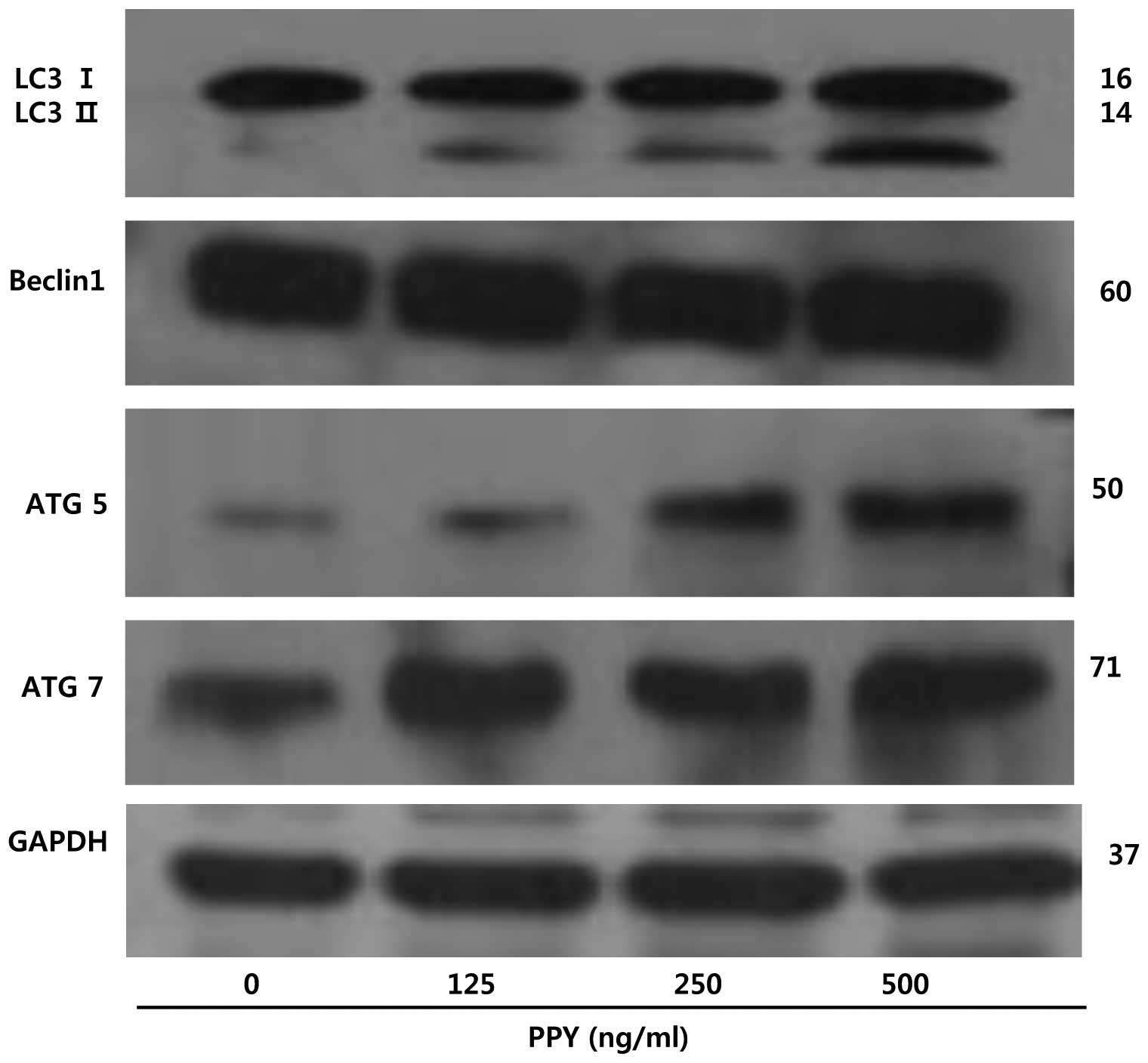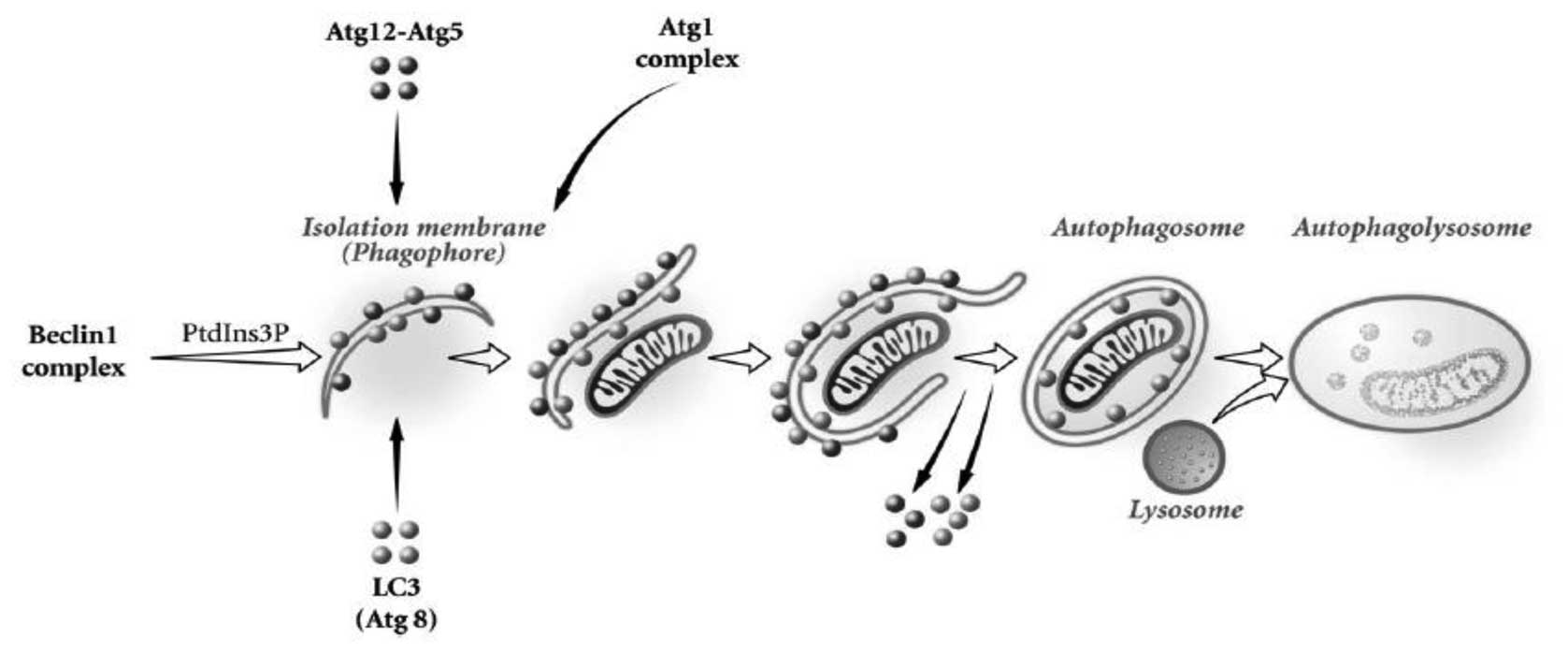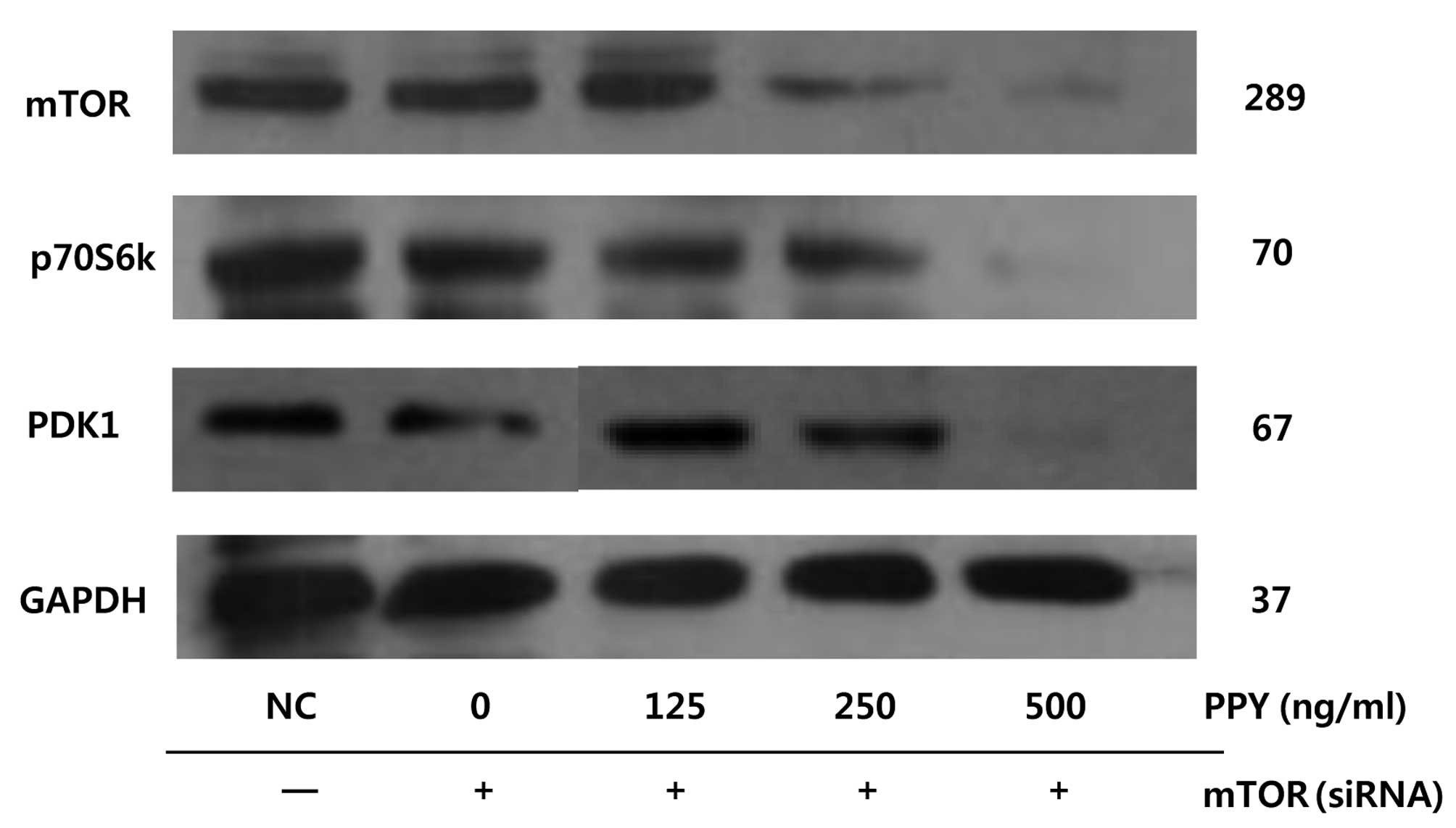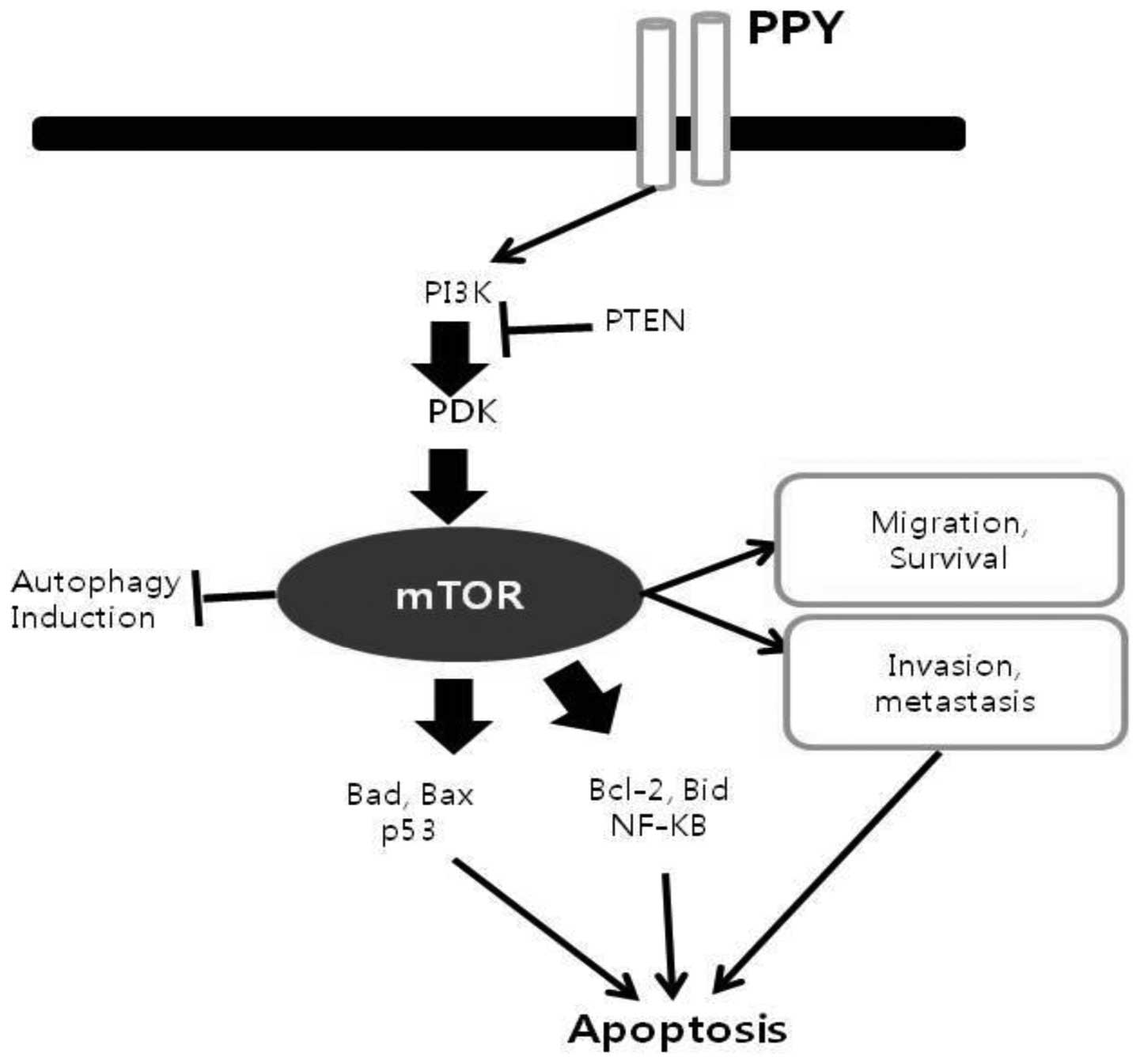|
1
|
American Cancer Society, Cancer Facts and
Figures. American Cancer Society; Atlanta, GA: 2009
|
|
2
|
He X, Wang Y, Zhu J, Orloff M and Eng C:
Resveratrol enhances the anti-tumor activity of the mTOR inhibitor
rapamycin in multiple breast cancer cell lines mainly by
suppressing rapamycin-induced AKT signaling. Cancer Lett.
301:168–176. 2011. View Article : Google Scholar
|
|
3
|
Hay N and Sonenberg N: Upstream and
downstream of mTOR. Genes Dev. 18:1926–1945. 2004. View Article : Google Scholar : PubMed/NCBI
|
|
4
|
Pattingre S, Espert L, Biard-Piechaczyk M
and Codogno P: Regulation of macroautophagy by mTOR and Beclin1
complexes. Biochimie. 90:313–323. 2008. View Article : Google Scholar
|
|
5
|
Bärlund M, Forozan F, Kononen J, et al:
Detecting activation of ribosomal protein S6 kinase by
complementary DNA and tissue microarray analysis. J Natl Cancer
Inst. 92:1252–1259. 2000. View Article : Google Scholar : PubMed/NCBI
|
|
6
|
Sekulic A, Hudson CC, Homme JL, et al: A
direct linkage between the phosphosphoinositide 3-kinase-AKT
signaling pathway and the mammalian target of rapamycin in
mitogen-stimulated and transformed cells. Cancer Res. 60:3504–3513.
2000.
|
|
7
|
Lmoki K, Li Y, Zhu T, Wu J and Guan KL:
TSC2 is phosphorylated and inhibited by AKT and suppresses mTOR
signaling. Nat Cell Biol. 4:648–657. 2002. View Article : Google Scholar
|
|
8
|
Chung J, Kuo CJ, Crabtree GR and Bieris J:
Rapamycin FKBP specifically blocks growth-dependent activation of
and signaling by the 70 kd S6 protein kinases. Cell. 69:1227–1236.
1992. View Article : Google Scholar : PubMed/NCBI
|
|
9
|
Holland EC, Sonenberg N, Pandolfi PP and
Thomas G: Signaling control of mRNA translation in cancer
pathogenesis. Oncogene. 23:3138–3144. 2004. View Article : Google Scholar : PubMed/NCBI
|
|
10
|
Adams JM and Cory S: The Bcl-2 protein
family: arbiters of cell survival. Science. 281:1322–1326. 1998.
View Article : Google Scholar : PubMed/NCBI
|
|
11
|
Antonsson B and Martinou JC: The Bcl-2
protein family. Exp Cell Res. 256:50–57. 2000. View Article : Google Scholar : PubMed/NCBI
|
|
12
|
Yin XM, Oltvai ZN and Korsmeyer SJ: BH1
and BH2 domain of Bcl-2 are required for inhibition of apoptosis
and heterodimerization with Bax. Nature. 369:321–323. 1994.
View Article : Google Scholar : PubMed/NCBI
|
|
13
|
Reed JC: Bcl-2 family protein: regulators
of apoptosis and chemo-resistance in hematologic malignancies.
Semin Hematol. 34:9–19. 1997.PubMed/NCBI
|
|
14
|
Johnstone RW, Ruefli AA and Lowe SW:
Apoptosis: a link between cancer genetics and chemotherapy. Cell.
108:153–164. 2002. View Article : Google Scholar : PubMed/NCBI
|
|
15
|
Malaguarnera L: Implications of apoptosis
regulators in tumorigenesis. Cancer Metastasis Rev. 23:367–387.
2004. View Article : Google Scholar : PubMed/NCBI
|
|
16
|
Khwaja A: Akt is more than just a Bad
kinase. Nature. 401:33–34. 1999. View
Article : Google Scholar : PubMed/NCBI
|
|
17
|
McCormick F: Cancer: survival pathways
meet their end. Nature. 428:267–269. 2004. View Article : Google Scholar : PubMed/NCBI
|
|
18
|
Karin M, Cao Y, Greten FR and Li ZW:
NF-kappaB in cancer: from innocent bystander to major culprit. Nat
Rev Cancer. 2:301–310. 2002. View
Article : Google Scholar : PubMed/NCBI
|
|
19
|
Steele RJ and Lane DP: p53 in cancer: a
paradigm for modern management of cancer. Surgeon. 3:197–205. 2005.
View Article : Google Scholar : PubMed/NCBI
|
|
20
|
Haldar S, Negrini M, Monne M, Sabbioni S
and Croce CM: Downregulation of Bcl-2 by p53 in breast cancer
cells. Cancer Res. 54:2095–2097. 1994.PubMed/NCBI
|
|
21
|
Miyashita T and Reed JC: Tumor suppressor
p53 is a direct transcriptional activator of the human bax gene.
Cell. 80:293–299. 1995. View Article : Google Scholar : PubMed/NCBI
|
|
22
|
Bentires-Alj M, Dejardin E, Viatour P, Van
Lint C, Froesch B, Reed JC, Mervile MP and Bours V: Inhibition of
the NF-kappa B transcription factor increases Bax expression in
cancer cell lines. Oncogene. 20:2805–2813. 2001. View Article : Google Scholar : PubMed/NCBI
|
|
23
|
Heckman CA, Mehew JW and Boxer LM:
NF-kappaB activates Bcl-2 expression in t(14;18) lymphoma cells.
Oncogene. 21:3898–3908. 2002. View Article : Google Scholar : PubMed/NCBI
|
|
24
|
Qu X, Yu J, Bhagat G, Furuya N, Hibshoosh
h and Troxel A: Promotion of tumorigenesis by heterozygous
disruption of the beclin1 autophagy gene. J Clin Invest.
112:1809–1820. 2003. View
Article : Google Scholar : PubMed/NCBI
|
|
25
|
Matshushita M, Suzuki NN, Obara K, Fujioka
Y, Ohsumi Y and Inagaki F: Structure of Atg5.Atg16, a complex
essential for autophagy. J Biol Chem. 282:6763–6772. 2007.
View Article : Google Scholar
|
|
26
|
Park SJ, Ryu J, Kim IH, Choi YH and Nam
TJ: Induction of apoptosis by a peptide from Porphyra yezoensis:
regulation of the insulin-like growth factor I receptor signaling
pathway in MCF-7 cells. Int J Oncol. 45:1011–1016. 2014.PubMed/NCBI
|
|
27
|
Yuan TL and Cantley LC: PI3K pathway
alterations in cancer: variations on theme. Oncogene. 27:5497–5510.
2008. View Article : Google Scholar : PubMed/NCBI
|
|
28
|
Xu X, Sakon M, Nagano H, Hiraoka N, et al:
Akt2 expression correlates with prognosis of human hepatocellular
carcinoma. Oncol Rep. 11:25–32. 2004.
|
|
29
|
Faivre S, Kroener G and Raymond E: Current
development of mTOR inhibitors as anticancer agents. Nat Rev Drug
Discov. 5:671–688. 2006. View
Article : Google Scholar : PubMed/NCBI
|
|
30
|
Dann SG and Thomas G: The amino acid
sensitive TOR pathway from yeast to mammals. FEBS Lett.
580:2821–2829. 2006. View Article : Google Scholar : PubMed/NCBI
|
|
31
|
Akar U, Ozpolat B, Mehta K, et al:
Targeting p70S6k prevented lung metastasis in a breast cancer
xenograft model. Mol Cancer Ther. 9:1180–1187. 2010. View Article : Google Scholar : PubMed/NCBI
|
|
32
|
Fesus L and Szondy Z: Transglutaminase 2
in the balance of cell death and survival. FEBS Lett.
579:3297–3302. 2005. View Article : Google Scholar : PubMed/NCBI
|
|
33
|
Herman JF, Mangala LS and Mehta K:
Implications of increased tissue transglutaminase (TG2) expression
in drug-resistant breast cancer (MCF-7) cells. Oncogene.
25:3049–3058. 2006. View Article : Google Scholar : PubMed/NCBI
|
|
34
|
Fesus L and Piacentini M: Transglutaminase
2: an enigmatic enezyme with diverse function. Trends Biochem Sci.
27:534–539. 2002. View Article : Google Scholar : PubMed/NCBI
|
|
35
|
Malek R, Borrowicz KK, Jargiełło M and
Czuczwar SJ: Role of nuclear factor kappaB in the in the central
nervous system. Pharmacological Rep. 59:25–33. 2007.
|
|
36
|
Jurgensmeier JM, Xie Z, Deveraux Q,
Ellerby L, Bredesen D and Reed JC: Bax directly induced release of
cytochrome c from isolated mitochondria. Proc Natl Acad Sci USA.
95:4997–5002. 1998. View Article : Google Scholar
|
|
37
|
Levine B and Kroemer G: Autophagy in the
pathogenesis of disease. Cell. 132:27–42. 2008. View Article : Google Scholar : PubMed/NCBI
|
|
38
|
Folkman J: Role of angiogenesis in tumor
growth and metastasis. Semin Oncol. 29:15–18. 2002. View Article : Google Scholar
|
|
39
|
Zhang DM, Liu JS, Deng LJ, et al:
Arenobufagin, a natural bufadienolide from toad venom, induces
apoptosis and autophagy in human hepatocellular carcinoma cells
through inhibition of PI3K/Akt/mTOR pathway. Carcinogenesis.
34:1331–1342. 2013. View Article : Google Scholar : PubMed/NCBI
|
|
40
|
Eskelinen FL: Maturation of autophagic
vacuoles in Mammalian cells. Autophagy. 1:1–10. 2005. View Article : Google Scholar
|
|
41
|
Jing Ji and Zheng PS: Activation of mTOR
signaling pathway contributes to survival of cervical cancer cells.
Gynecol Oncol. 117:103–108. 2010. View Article : Google Scholar
|
|
42
|
Cho MY, Park SY, Park S, Lee YR, Han GD
and Kim JA: Geranyl derivative of phloroacetophenone induces cancer
cell-specific apoptosis through Bax-mediated mitochondrial pathway
in MCF-7 human breast cancer cells. Biol Pharm Bull. 35:98–104.
2012. View Article : Google Scholar : PubMed/NCBI
|
|
43
|
Lee KB, Byun HJ, Park SH, Park CY, Lee SH
and Rho SB: CYR61 controls p53 and NF-κB expression through
PI3K/AKT/mTOR pathways in carboplatin-induced ovarian cancer cells.
Cancer Lett. 315:86–95. 2012. View Article : Google Scholar
|
|
44
|
Klionsky DJ: The molecular machinery of
autophagy: unanswered questions. J Cell Sci. 118:7–18. 2005.
View Article : Google Scholar
|
|
45
|
Dumont FJ and Su Q: Mechanism of action of
the immunosuppressant rapamycin. Life Sci. 58:373–395. 1996.
View Article : Google Scholar : PubMed/NCBI
|
|
46
|
Windecker S, Roffi M and Meier B:
Sirolimus eluting stent: a new era in interventional cardiology?
Curr Pharm Des. 9:1077–1094. 2003. View Article : Google Scholar : PubMed/NCBI
|
|
47
|
Gao XM, Wong G, Wang B, et al: Inhibition
of mTOR reduces chronic pressure overload cardiac hypertrophy and
fibrosis. J Hypertens. 24:1663–1670. 2006. View Article : Google Scholar : PubMed/NCBI
|
|
48
|
Simler NR, Howell DC, Marshall RP, et al:
The rapamycin analogue SDZ RAD attenuates bleomycin-induced
pulmonary fibrosis in rat. Eur Respir J. 19:1124–1127. 2002.
View Article : Google Scholar : PubMed/NCBI
|
|
49
|
Achenbach TV, Barrow RK and Heerneier K:
Oligonucleotide-based knockdown technologies: antisense versus RNA
interference. Chembiochem. 4:928–935. 2003. View Article : Google Scholar : PubMed/NCBI
|
|
50
|
Burnet PE, Barrow RK, Cohen NA, Snyder SH
and Sabatini DM: RAFT1 phosphorylation of the translational
regulators p70 S6 kinase and 4E-BP1. Proc Nat Acad Sci USA.
95:1432–1437. 1998. View Article : Google Scholar
|















